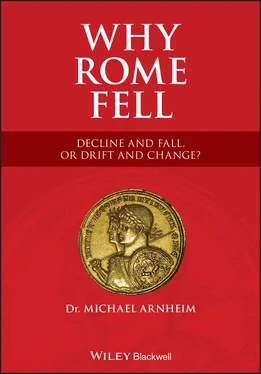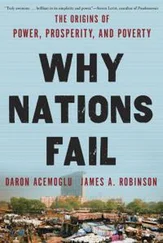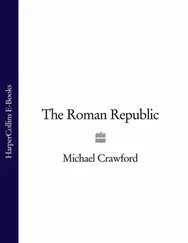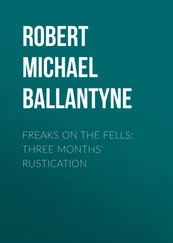Michael Arnheim - Why Rome Fell
Здесь есть возможность читать онлайн «Michael Arnheim - Why Rome Fell» — ознакомительный отрывок электронной книги совершенно бесплатно, а после прочтения отрывка купить полную версию. В некоторых случаях можно слушать аудио, скачать через торрент в формате fb2 и присутствует краткое содержание. Жанр: unrecognised, на английском языке. Описание произведения, (предисловие) а так же отзывы посетителей доступны на портале библиотеки ЛибКат.
- Название:Why Rome Fell
- Автор:
- Жанр:
- Год:неизвестен
- ISBN:нет данных
- Рейтинг книги:3 / 5. Голосов: 1
-
Избранное:Добавить в избранное
- Отзывы:
-
Ваша оценка:
- 60
- 1
- 2
- 3
- 4
- 5
Why Rome Fell: краткое содержание, описание и аннотация
Предлагаем к чтению аннотацию, описание, краткое содержание или предисловие (зависит от того, что написал сам автор книги «Why Rome Fell»). Если вы не нашли необходимую информацию о книге — напишите в комментариях, мы постараемся отыскать её.
Why Rome Fell: Decline and Fall, or Drift and Change?
Why Rome Fell
Why Rome Fell
Why Rome Fell — читать онлайн ознакомительный отрывок
Ниже представлен текст книги, разбитый по страницам. Система сохранения места последней прочитанной страницы, позволяет с удобством читать онлайн бесплатно книгу «Why Rome Fell», без необходимости каждый раз заново искать на чём Вы остановились. Поставьте закладку, и сможете в любой момент перейти на страницу, на которой закончили чтение.
Интервал:
Закладка:
I agree with Syme on the monopoly of office and power in the Roman Republic, but I certainly do not agree with the application of his one-size-fits-all oligarchic theory to the Augustan Principate. Accepting that Augustus initiated a monarchy, Syme tried to square the circle with the self-contradictory and erroneous oracular comment that “A monarchy rules through an oligarchy.”
Monarchy and oligarchy are diametric opposites, representing the two poles of governmental power. (See Chapter 6for a full discussion.) By “monarchy,” I mean true, strong monarchy, a system in which power is concentrated in the hands of one person, usually with support from the lower classes, against the return of the oligarchy or aristocracy, which they have most likely overthrown. An oligarchy, on the other hand, is normally intent on perpetuating its shared group power and is, therefore, afraid of any one person becoming too powerful and having too much popular support. The vicissitudes of Roman history epitomize this type of conflict.
In the Res Gestae , as we have seen, Augustus makes a point of stating that he had no more potestas than any of his colleagues in office but surpassed everyone in auctoritas . ( R.G . 34.5.) Auctoritas means “influence” and potestas refers to legally authorised, constitutional power. So, Augustus is trying to portray his position as conforming to the norms of the Republican constitution, which he claims to have restored. The fact that he had more auctoritas than anyone else was not unlawful. It was simply the expression of the esteem and prestige enjoyed by Augustus, similar to that which even great anti-monarchical Republican heroes of the past like Cincinnatus might have enjoyed. But what is potentia ?
Syme does not mention potestas at all, but rather potentia and he does not suggest that this was ever given up, only that it masqueraded under the “respectable name of auctoritas .” Unlike potestas , which is duly authorised, constitutional power, and auctoritas , which was not power at all, potentia was unbridled, naked power or might.
Syme’s portrayal of Augustus is a gross exaggeration of Augustus’s position, but it is correct insofar as the regime is shown to be monarchical. Yet, no sooner does Syme condemn Augustus as a lawless despot than we come across the bombshell quoted above: “In all ages, whatever the form and name of government, be it monarchy, republic, or democracy, an oligarchy lurks behind the façade.” (Syme 1939, 7, 15.) Was Augustus’s rule not monarchical then? Syme certainly believed it was. So, how does he square this with his sweeping blanket theory of oligarchy? “A monarchy rules through an oligarchy,” is Syme’s baffling response. (Ibid., p. 8.) In 1989, Syme is still barking up the oligarchy tree: “Oligarchy is imposed as the guiding theme, the link from age to age whatever be the form and name of government.” (Syme 1989, p. 13.)
This makes little sense. In a purely banal sense, it is of course true that no individual can single-handedly rule a state. The ruler will need the assistance and support of others in order to maintain power. But here we come to a crucial divide: between, on the one hand, those who serve a ruler in an inferior capacity and who are removable by the ruler at will, and, on the other hand, those who share his power. Where a ruler is surrounded by purely inferior minions who do his bidding, that is not an oligarchy because the minions have no independent power-base of their own. In that scenario, power is concentrated in the hands of the ruler, who exercises sole power. It is, therefore, a monarchy. By contrast, an “oligarchy” is a form of government where power is shared by the members of an elite group.
The essential difference between monarchy and oligarchy is the whereabouts of power. It is not always obvious whether the entourage surrounding a ruler is beholden to him, whether he is beholden to them, or possibly whether they are mutually dependent on each other.
The key question to ask is this: Who has the whip hand?
The existence of a ruling party, especially in a one-party state, may sometimes give a clue to the whereabouts of power but not always. So, for example, Adolf Hitler ruled Germany as “Führer” of the Nazi Party, but it would be a mistake to see power as vested in the Party, or any members of the Party, rather than in Hitler personally. The same applies to Communist Party leaders, such as Joseph Stalin in the Soviet Union, Cuba’s Fidel Castro, and Mao Zedong (Mao Tse-tung) and Xi Jinping in China. As far as Rome is concerned, there was in fact no Augustan “party” although Syme seems to have thought there was; but even if there had been, that would not necessarily prove that the system was an oligarchy.
Augustus’s Consilium Principis , drawn from his amici , which is discussed above, did not constitute a party in any sense. Nor was it a council or cabinet, whose advice he was obliged to take. Indeed, certain important issues on which we might expect him to have taken advice do not appear to have been referred to the Consilium at all (Sherwin-White). Membership of the Consilium was not fixed, its meetings were irregular, and the emperor was not obliged to accept its advice in any event. Informal chats inter amicos (among friends), likewise, do not constitute any kind of oligarchy.
Like strong monarchs throughout history who understood the realities of power, Augustus clearly recognized that the old Republican aristocracy, and especially the nobiles , “descendants of consular houses, whether patrician or plebeian in origin” (Syme 1989, p. 10), were foes or potential foes to his regime, just as they had been to Julius Caesar. But he recognized that Julius Caesar’s blunt forthrightness was not the answer, so he developed much subtler tactics to neutralize potential enemies, which enabled him to establish one of the stablest and most durable regimes in history.
Syme recognized Augustus’s defeat of the old nobility: “Not a mere faction of the nobility had been defeated, but a whole class.” (Syme 1939, p. 490.) In addition, “Power receding, aristocrats looked to priesthoods for ‘dignitas’ and social eminence” (Syme 1989, p, 3 f), recognition of the fact that the defeated aristocrats understood the need to look outside government appointments to achieve or maintain a position in society.
Hostility to the nobiles was engrained in the Principate from its military and revolutionary origins. In the first decade of his constitutional rule, Augustus employed not a single nobilis among the legates who commanded the armies in his provincia , and only three men of consular standing. When his position becomes stronger, and a coalition government based largely on family ties has been built up, nobiles like Ahenobarbus, Piso and Paullus Fabius Maximus govern the military provinces, it is true. But a rational distrust persists, confirmed under his successors by certain disquieting incidents, and leads to the complete exclusion of the nobiles , the delayed but logical end of Revolution and Empire. (Syme 1939, p. 502.)
Except for the suggestion of a “coalition government”, of which there is no evidence whatsoever, Syme correctly highlights Augustus’s reluctance to give military commands to nobiles . And Syme also looks ahead, beyond Augustus, to “…the complete exclusion of the nobiles .” Yet Syme still failed to recognize that the regime established by Augustus was not an oligarchy at all but a different type or model of government altogether, a form of monarchy, in which power was concentrated in the hands of a single individual and that this form of government would continue long after Augustus.
Читать дальшеИнтервал:
Закладка:
Похожие книги на «Why Rome Fell»
Представляем Вашему вниманию похожие книги на «Why Rome Fell» списком для выбора. Мы отобрали схожую по названию и смыслу литературу в надежде предоставить читателям больше вариантов отыскать новые, интересные, ещё непрочитанные произведения.
Обсуждение, отзывы о книге «Why Rome Fell» и просто собственные мнения читателей. Оставьте ваши комментарии, напишите, что Вы думаете о произведении, его смысле или главных героях. Укажите что конкретно понравилось, а что нет, и почему Вы так считаете.












